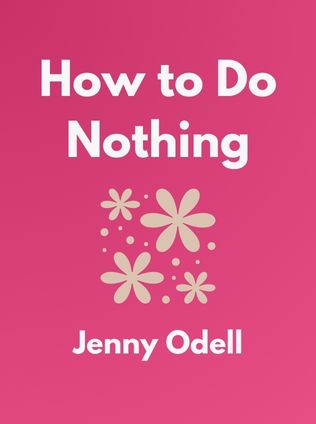
How to Do Nothing
Resisting the Attention Economy
By Jenny Odell
Published 04/2019
About the Author
Jenny Odell is a remarkable figure in contemporary discourse on the intersection of technology, art, and society. As a professor and visual artist based in the San Francisco Bay Area, her work has consistently focused on themes of observation, attention, and the value of the natural world amidst the overwhelming influence of digital culture. Odell's unique perspective is shaped by her academic background and artistic endeavors, which together allow her to critically engage with how modern life is shaped by economic and technological forces.
Odell's influence as a thought leader has grown significantly following the publication of her book, How to Do Nothing: Resisting the Attention Economy. In this work, she combines cultural critique, personal narrative, and critical theory to challenge the pervasive culture of productivity and the commodification of time and attention. Odell's voice is one of resistance and empowerment, encouraging readers to reclaim their agency and redefine their relationship with the world around them.
Throughout her career, Odell has been committed to exploring how art and technology intersect with the human experience. Her work often involves detailed observations of natural and urban environments, prompting a deeper understanding of the spaces we inhabit. As an educator, she brings these insights into the classroom, fostering a new generation of thinkers who are equipped to critically examine the world through a similar lens.
Main Idea
How to Do Nothing by Jenny Odell presents a radical critique of the modern attention economy—a concept that refers to the monetization of human attention in a digital age. In this book, Odell challenges the pervasive notion that every moment of our lives must be directed towards productivity and financial gain. Instead, she advocates for a form of resistance that involves consciously choosing where to place our attention, encouraging a return to activities that are often considered "non-productive" by capitalist standards.
At its core, Odell's argument is that "doing nothing" is not synonymous with passivity or laziness. Rather, it is about reclaiming control over our time and attention in a world that increasingly demands both. By disengaging from the pressures of the attention economy, individuals can reconnect with their communities, deepen their engagement with the natural world, and ultimately find greater fulfillment and meaning in their lives. This book is both a manifesto and a guide for those who wish to resist the relentless demands of modern life and seek a more balanced and mindful existence.
Table of Contents
- The Attention Economy
- What It Means to Do Nothing
- How to Do Nothing
The Attention Economy
How the Attention Economy Works
Jenny Odell begins her critique by examining the attention economy—a system where human attention is commodified and sold as a valuable resource. This concept emerged prominently in the 1980s when corporate deregulation, combined with technological advancements, allowed companies to exploit more aspects of daily life for profit. Odell explains that this shift has led to a culture where individuals feel compelled to constantly be productive, with every moment of their time being measured in terms of its economic value.
The attention economy operates on the principle that in an age of information overload, the scarcest resource is human attention. Companies and advertisers compete for this attention, often using manipulative tactics designed to maximize engagement. This has profound implications for how we live our lives, as it creates a constant demand for our focus, leaving little room for deep, meaningful engagement with any single activity. Odell argues that this environment fosters a fragmented existence, where people are continuously pulled in multiple directions, making it difficult to concentrate on what truly matters.
“The attention economy incentivizes actions and thoughts that are immediate and superficial, often at the expense of deeper, more thoughtful engagement.” — Jenny Odell
The Monetization of Time and Attention
Odell delves deeper into the mechanics of the attention economy, focusing on how time and attention have been monetized in the digital age. The internet and social media platforms have become key players in this economy, generating revenue through advertisements, sponsorships, and data collection. These platforms are designed to maximize user engagement, often employing psychological tricks such as notifications, likes, and algorithmically curated content to keep users hooked.
This constant demand for attention has significant consequences. One of the most concerning is the erosion of context and depth in our interactions and experiences. In a world where speed and efficiency are prized, there is little room for the slow, deliberate processes that are necessary for understanding complex issues or developing meaningful relationships. Odell argues that this leads to a shallow culture where quick, surface-level judgments replace thoughtful consideration, making individuals more susceptible to manipulation and misinformation.
Sign up for FREE and get access to 1,400+ books summaries.
You May Also Like
The Subtle Art of Not Giving a F*ck
A Counterintuitive Approach to Living a Good Life
By Mark MansonRich Dad Poor Dad
What the Rich Teach Their Kids About Money - That the Poor and Middle Class Do Not!
By Robert T. KiyosakiHow To Win Friends and Influence People
The All-Time Classic Manual Of People Skills
By Dale CarnegieFreakonomics
A Rogue Economist Explores the Hidden Side of Everything
By Steven D. Levitt and Stephen J. Dubner



















